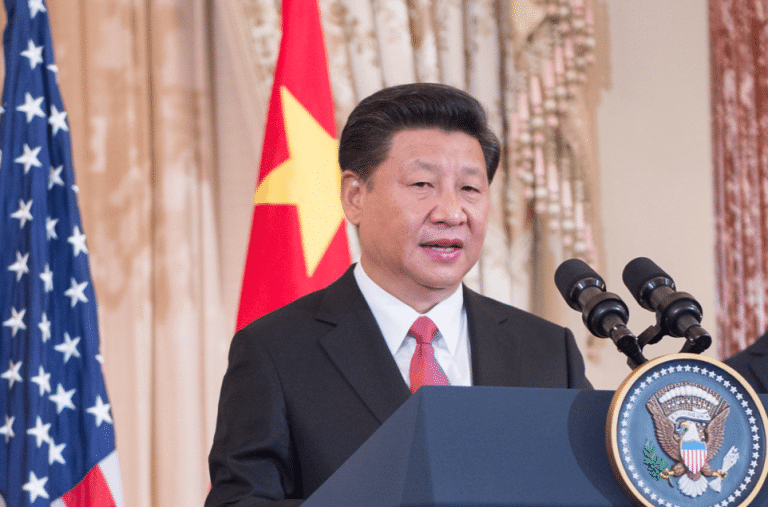Thousands of people turned out in protest on Wednesday outside municipal government offices in the central Chinese city of Wuhan over major cuts to their medical benefits, according to local residents and video footage posted to social media.
Video clips uploaded to social media showed a large crowd of older people in raincoats and holding umbrellas gathered in rainy weather in a public space outside the gates of the city government compound, with police in high-visibility jackets linking arms to prevent them from approaching the gates.
A resident of Wuhan, the epicenter of the COVID-19 pandemic, surnamed Zhang said both uniformed and plainclothes police were out in large numbers at the protest, with several official buses parked at the scene.
“There were a lot of police officers there protecting [the municipal government], but this is a matter of public feeling,” he said.
The protest came after warnings from the central government in Beijing that it won’t be bailing out cash-strapped local governments, whose coffers have been drained by three years of President Xi Jinping’s zero-COVID policy, which ended in December.
“This country is in trouble, and they haven’t raised medical payments — how can they reduce them?” Zhang said. “How are people supposed to manage?”
He said the authorities had known the protest was coming and had held a “stability maintenance” meeting at city hall to deal with the issue.
“Retirees are demanding an explanation from the government as to why their medical benefits have been cut from 260 yuan (US$38) a month to less than 100 yuan (US$15),” a subtitle on one of the videos says.
“If they don’t get an answer from the government, they will hold an even bigger rally,” the text says.
“The cuts always come for ordinary people first, huh,” comments a voice on the same video. “Why don’t officials’ [benefits] get cut? It’s disgusting!”
“This doesn’t look like a scene created by U.S. or overseas forces or whatever,” a person comments on one of the video clips. “This is entirely the doing of the government.”
“They all talk about serving the people, but who are they really working for? There are more than a million retired workers in Wuhan, and there are thousands, possibly more than 10,000 here today.”
Retired steelworkers
A local resident who gave only the surname Gao for fear of reprisals said the majority of protesters were retired workers at the Wuhan Iron and Steel plant, with some from other state-owned enterprises.
“They are calling for their medical benefits to be restored to their original level, which was 260.93 yuan a month,” Gao said. “A lot of people have had theirs cut to 88 yuan or 82 yuan.”
“They are calling on the government to give them a public response [today] … and if they don’t, they will hold a rights protection rally in Zhongshan Park on Feb. 15,” he said.
The payments are intended to cover the costs of repeat prescriptions in retirement, and come at a time of skyrocketing healthcare costs that have put medical treatment beyond the reach of many in retirement, Gao said.
“There are nearly 2 million retirees in Wuhan,” he said.
A retiree from Wuhan’s Jiang’an district who gave only the surname Chen said the cuts have had an impact on huge numbers of people, and that more public protest is likely.
“Anyone who has a personal stake in this will go,” Chen said, adding that he had been planning to go, but had held off after getting a warning from his local police station.
“People in the community where I live contacted me asking me to go with them last night,” Chen said. “But I was warned off by the police.”
“I told them I definitely wanted to go, so a policeman drove me, but I was only allowed to watch from a long way off,” he said.
A Jiang’an district resident who gave only the surname Pang said some people had also been protesting big cuts to funeral expense claims, from 70,000 yuan (US$10,300) to just 30,000 yuan (US$4,400) per person.
“It wasn’t just Wuhan Iron and Steel retirees who went, but also many other retired workers from different industries, and people whose homes had been [forcibly] demolished,” she said.
Repeated calls to the municipal government offices and to its Letters and Visits [complaints] department went unanswered during office hours on Wednesday.
Crushing people who speak up
China’s army of petitioners, who flood the ruling Chinese Communist Party’s official complaints departments daily, frequently report being held in unofficial “black jails,” beaten, or otherwise harassed, if they persist in a complaint beyond its initial rejection at the local level.
They are often escorted home forcibly by “interceptors” sent by their local governments to prevent negative reports from reaching the ears of higher authorities.
They then face surveillance, harassment and possible detention on criminal charges.
People in China frequently challenge those in power, despite nationwide measures aimed at nipping popular protest in the bud, the U.S.-based think tank Freedom House reported in November 2022.
Despite pervasive surveillance, a “grid” system of law enforcement at the neighborhood level and targeted “stability maintenance” system aimed at controlling critics of the government before they take action, the group identified hundreds of incidents of public protest between June and September 2022 alone.
This article was originally published by Radio Free Asia and is reprinted with permission.
American Military News Rephrased By: InfoArmed
